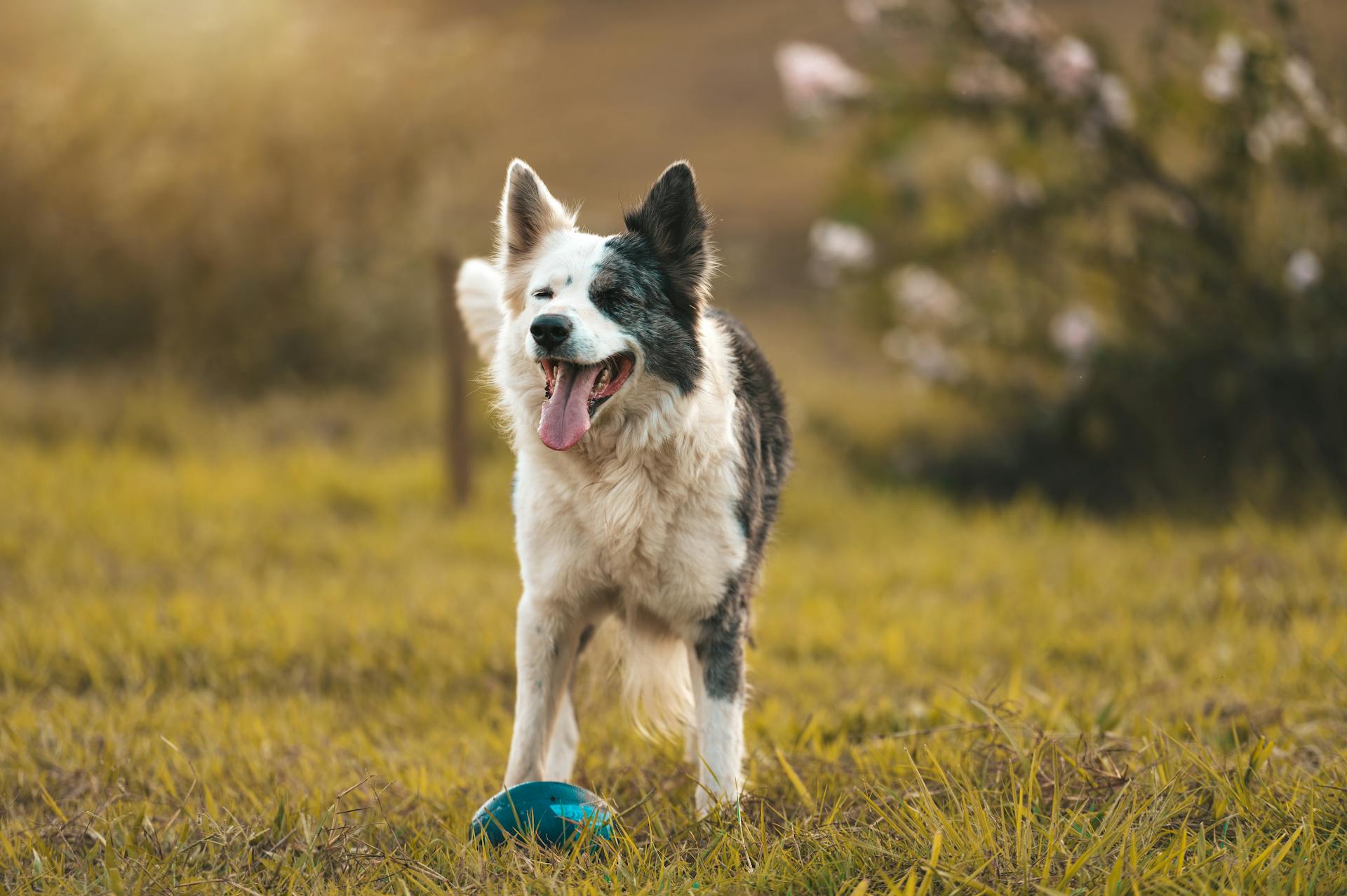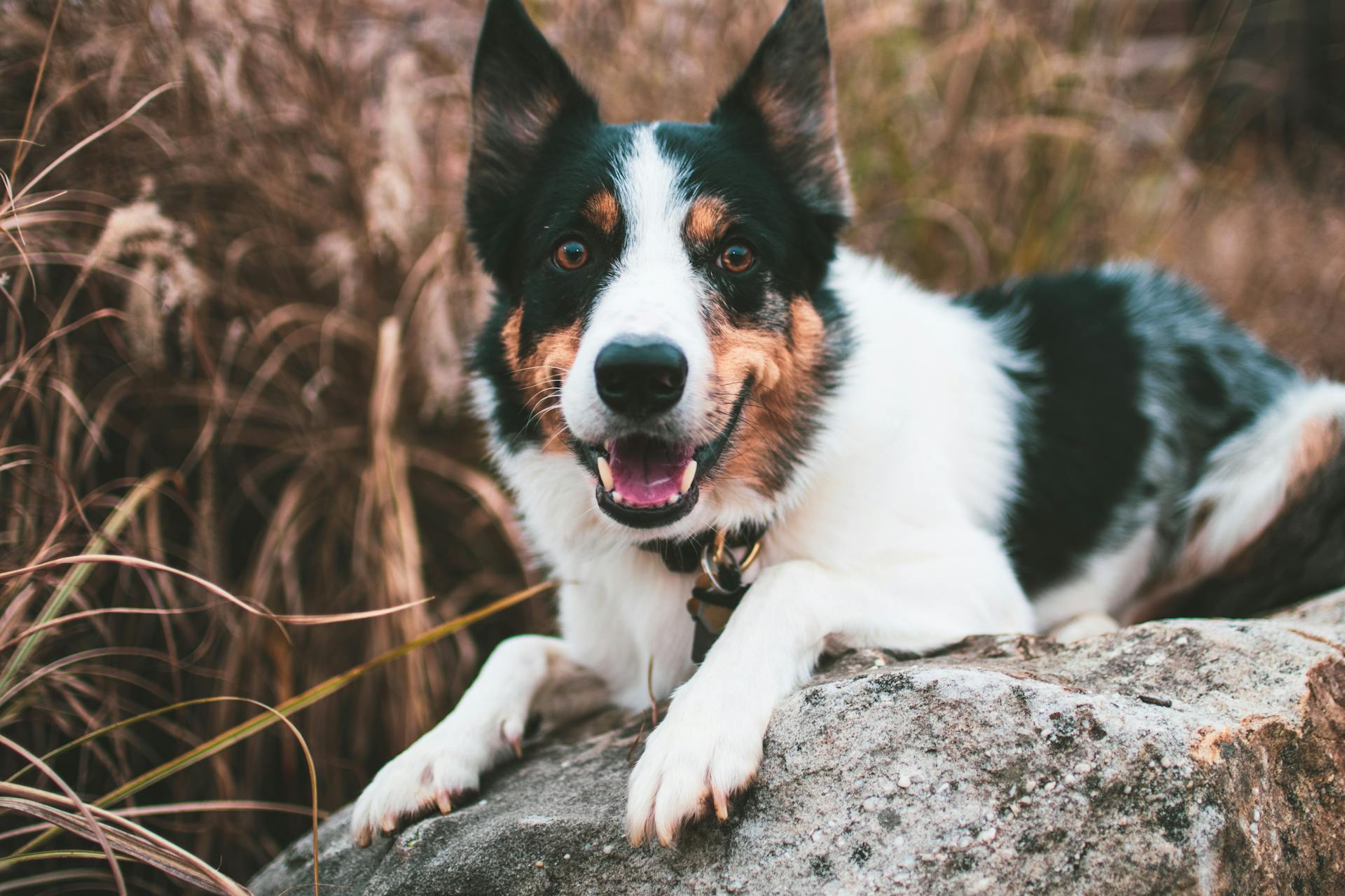
Border Collies are known for their strong herding instincts, but they also make great family pets. They are highly intelligent and thrive on mental and physical stimulation.
Their loyalty is unmatched, often forming strong bonds with their family members. This loyalty can sometimes lead to separation anxiety if left alone for extended periods.
Border Collies are naturally protective of their families, but they are not generally aggressive towards strangers. With proper socialization, they can become confident and calm in new situations.
Their high energy levels require regular exercise and mental stimulation to prevent boredom and destructive behavior.
Intriguing read: Do German Shepherds Make Good Pets
Care and Lifestyle
Border Collies are highly social dogs that thrive on interaction and mental stimulation. They need someone to roam with and specific activities to do, or they may develop habits like chasing cars or digging.
To keep your Border Collie happy and healthy, regular exercise is a must. A minimum of weekly coat brushing is also essential to prevent matting and tangling.
If you're a multi-pet household, be prepared for potential altercations due to the dog's herding behavior. They may nudge and nip at humans and other pets to get them in line.
A proper diet and exercise routine are crucial for a Border Collie's overall well-being. A high-quality diet appropriate for their age, along with regular exercise, will help keep them healthy and happy.
To prevent boredom and destructive behavior, keep your dog's mind and body active through activities like agility competitions, flyball, and herding events.
Here's a checklist for caring for your Border Collie:
- Supervise your pet as you would a toddler.
- Brush their coat at least weekly.
- Clean their ears weekly.
- Brush their teeth at least twice a week.
- Exercise them regularly, but don't overdo it at first.
Border Collies are sensitive to loud noises, so be prepared for potential stress during events like thunderstorms, New Year's Eve, and the Fourth of July.
Temperament and Behaviour
Border Collies are a highly intelligent and energetic breed that can make great family pets, but their temperament and behaviour can be a bit quirky. They thrive in active, outdoorsy households where they can be part of the action.
Border Collies are generally a sociable breed that enjoy the company of other dogs and can get along with cats if introduced from an early age. However, they can be more easily startled by loud noises, strange people, and rude dogs, which is why training is essential to help them become confident and calm.
One common issue with Border Collies is jumping up, which is a natural fit for their energetic personality and high energy level. Consistent training and the right approach can help teach them to stop jumping up.
Border Collies can also be prone to anxiety, aggression, and nervousness, especially if they're not properly socialized or if they have certain genetic lines that make them more sensitive. But don't worry, with the right training, these issues can be vastly improved or even solved.
Here are some common Border Collie behavioural problems and how to address them:
- Jumping up: Consistent training and the right approach can help teach them to stop.
- Anxiety, aggression, and nervousness: Proper socialization and the right training can help improve or solve these issues.
- Excessive barking: Providing enough exercise and mental stimulation can help reduce barking, and seeking the advice of an accredited behaviourist can also be helpful.
Overall, Border Collies are highly intelligent and trainable dogs that require consistent and clear training to reach their full potential. With patience, love, and the right approach, they can become wonderful and loving companions.
Training and Socialization
Border Collies are highly trainable dogs that thrive on mental and physical stimulation. They excel in obedience, agility, and other dog sports due to their intelligence, athleticism, and strong work ethic.
Early socialization is crucial for Border Collies, as they can be wary of strangers and may develop anxiety if not properly introduced to new people and environments.
With consistent training and positive reinforcement, Border Collies can become well-behaved companions and learn to respect boundaries.
In fact, research has shown that Border Collies that receive early socialization and training are less likely to develop behavioral problems later in life.
However, without proper training and socialization, Border Collies can become over-energized and destructive, leading to problems for both the dog and its owner.
See what others are reading: Hip Problems in Border Collies
Health and Genetics
Border collies are generally a healthy breed, but like any breed, they can inherit certain health conditions. Responsible breeders work to minimize the risk of these issues.
Hip dysplasia is a common condition that can affect border collies, causing the hip sockets to form abnormally. This can lead to arthritis and mobility issues later in life.
Explore further: Cardigan Welsh Corgi Health Issues
Epilepsy is another neurological disease that can cause seizures in border collies. Fortunately, breeders can screen for this condition to help identify affected dogs.
Collie eye anomaly is a mild inherited disease that affects vision, but it's usually not a major concern for border collies. Breeders can screen for this condition to help prevent its occurrence.
Here are some common health problems to be aware of in border collies:
- Hip dysplasia: Abnormal formation of the hip sockets.
- Osteochondritis dissecans (OCD): Abnormal development of cartilage on the end of a bone.
- Epilepsy: Neurological disease causing seizures.
- Collie eye anomaly: Inherited disease affecting vision.
Common Health Problems
As a responsible dog owner, it's essential to be aware of the potential health issues that can affect your border collie. Hip dysplasia, a condition where the hip sockets form abnormally, can be a concern.
While it's not a guarantee that your dog will develop hip dysplasia, responsible breeders can help minimize the risk by breeding dogs that meet high breed standards.
Osteochondritis dissecans (OCD) is another condition that can affect border collies, resulting in the abnormal development of cartilage on the end of a bone.
Epilepsy, a neurological disease that causes seizures, can also be a concern for border collie owners.
Collie eye anomaly, an inherited disease that impairs vision, is typically mild in border collies, but it's essential to work with a breeder who can screen for this condition.
Here are some common health problems to be aware of in border collies:
- Hip dysplasia: A condition where the hip sockets form abnormally.
- Osteochondritis dissecans (OCD): A condition resulting in the abnormal development of cartilage on the end of a bone.
- Epilepsy: A neurological disease that causes seizures.
- Collie eye anomaly: An inherited disease that impairs vision, typically mild in border collies.
General Health Information
Genetics plays a significant role in determining our overall health, with some genetic variations increasing the risk of certain diseases.
Having a family history of a particular disease can be a strong indicator of your own risk, with studies showing that people with a family history of heart disease are more likely to develop it themselves.
Genetic testing can provide valuable insights into your genetic predispositions, helping you make informed decisions about your health and lifestyle.
Your genetic makeup can influence your response to certain medications, with some people being more sensitive to the effects of certain drugs due to their genetic profile.
Maintaining a healthy lifestyle, including a balanced diet and regular exercise, can help mitigate the effects of genetic predispositions and reduce your risk of developing certain diseases.
Genetic counseling can provide guidance on how to manage genetic health risks and make informed decisions about your health.
For another approach, see: Are Australian Cattle Dogs Good Family Dogs
Genetic Predispositions

Border Collies are generally a healthy breed, but like any breed, they can be prone to certain genetic health issues. Hip dysplasia is one condition that can occur, where the hip sockets form abnormally.
Some breeds are more prone to certain health issues than others. Responsible dog breeders strive to maintain the highest breed standards to minimize the risk of inherited health problems.
Epilepsy is a neurological disease that can cause seizures in Border Collies. This is a serious condition that requires proper diagnosis and treatment.
Collie eye anomaly is an inherited disease that can impair a dog's vision, but it's usually mild in Border Collies. Breeders can screen for this condition to help prevent it.
Border Collies can also be prone to certain behavioral problems due to their genetic makeup. Anxiety, aggression, nervousness, and nippiness are common issues that can arise from their herding instincts.
Here are some common genetic predispositions in Border Collies:
- Hip dysplasia
- Osteochondritis dissecans (OCD)
- Epilepsy
- Collie eye anomaly
- Anxiety, aggression, nervousness, and nippiness
Exercise and Activity
Border Collies are extremely high-energy dogs that require a lot of exercise and mental stimulation to stay happy and healthy. They need at least two hours of exercise every day, which can be broken up into several walks and playtime.
A long, brisk walk is a must, and it's best to do this on-leash to prevent them from chasing cars and bicycles. You can also play fetch or Frisbee with your Border Collie in a safe area to burn off some of their energy.
Border Collies are highly intelligent and respond well to positive reinforcement techniques, so make sure you have training treats on hand. They also excel in dog sports, especially agility and disc dog competition.
Here are some exercise ideas for your Border Collie:
- Long walks (at least two hours a day)
- Playtime in a safe area (fetch, Frisbee, etc.)
- Agility training
- Disc dog competition
- Running (Border Collies make great running buddies)
- Puzzle toys and mental stimulation
- Flyball (a relay race for dogs)
Remember, the more exercise and mental stimulation you provide for your Border Collie, the happier and healthier they'll be.
Interacting with Border Collies
Border Collies are loving and loyal dogs.
They thrive on attention and interaction, so be prepared to spend plenty of time with them.
To keep them happy and healthy, you need to provide them with regular exercise and mental stimulation.
Owning a Border Collie takes a lot of time and commitment, but the reward is well worth it.
They'll give you plenty of love and loyalty in return for the time you spend with them.
Discover more: Are German Shepherds Good for First Time Owners
Special Considerations
Border Collies are highly energetic dogs that require regular exercise to stay happy and healthy, which can be a challenge for some owners.
They are also highly intelligent dogs that thrive on mental stimulation, so they need plenty of engaging activities to keep them occupied.
Border Collies are naturally protective of their families, but they can be wary of strangers, which may make them seem aloof or unfriendly to some people.
They have a strong herding instinct and may try to herd children, other pets, or even cars, so close supervision is crucial.
Border Collies are highly sensitive dogs that respond well to positive reinforcement training, but they can be sensitive to criticism or harsh corrections.
They are generally good with children if socialized properly from an early age, but they can be too energetic for very young kids.
Check this out: Why Are Labradors so Friendly
Frequently Asked Questions
Are Border Collies not cuddly?
No, Border Collies are actually known for their affectionate nature and love of cuddling. In fact, they often snuggle up with their owners to stay warm, relieve stress, or provide comfort.
Is a Border Collie a good family dog?
Border Collies are a great choice for families due to their energetic and even-tempered nature. With proper introduction, they get along well with children and other pets
Are Border Collies friendly with strangers?
Border Collies can be friendly with familiar people, but may be standoffish with strangers. They may require time and effort to warm up to new individuals.
Can a Border Collie be a house dog?
Yes, a Border Collie can be a house dog, but they require regular outdoor exercise to satisfy their intense herding instincts.
Sources
- https://www.thesprucepets.com/breed-profile-border-collie-1117942
- https://www.petplan.co.uk/pet-information/dog/breed/border-collie/
- https://www.hudsonanimalhospitalnyc.com/services/dogs/breeds/border-collie
- https://www.pdsa.org.uk/pet-help-and-advice/looking-after-your-pet/puppies-dogs/medium-dogs/border-collie
- https://www.bestmatedogtraining.co.nz/training-a-border-collie
Featured Images: pexels.com


